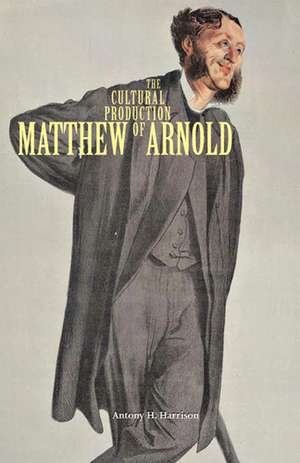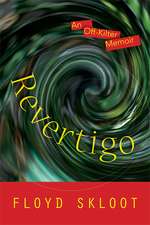The Cultural Production of Matthew Arnold
Autor Antony H. Harrisonen Limba Engleză Paperback – 14 noi 2009
The career of Matthew Arnold as an eminent poet and the preeminent critic of his generation constitutes a remarkable historical spectacle orchestrated by a host of powerful Victorian cultural institutions.
The Cultural Production of Matthew Arnold investigates these constructions by situating Arnold’s poetry in a number of contexts that partially shaped it. Such analysis revises our understanding of the formation of the elite (and elitist) male literary-intellectual subject during the 1840s and 1850s, as Arnold attempts self-definition and strives simultaneously to move toward a position of ideological influence upon intellectual institutions that were contested sites of economic, social, and political power in his era.
Antony H. Harrison reopens discussion of selected works by Arnold in order to make visible some of their crucial sociohistorical, intertextual, and political components. Only by doing so can we ultimately view the cultural work of Arnold “steadily and … whole,” and in a fashion that actually eschews this mystifying premise of all Arnoldian inquiry which, by the early twentieth century, had become wholly naturalized in the academy as ideology.
The Cultural Production of Matthew Arnold investigates these constructions by situating Arnold’s poetry in a number of contexts that partially shaped it. Such analysis revises our understanding of the formation of the elite (and elitist) male literary-intellectual subject during the 1840s and 1850s, as Arnold attempts self-definition and strives simultaneously to move toward a position of ideological influence upon intellectual institutions that were contested sites of economic, social, and political power in his era.
Antony H. Harrison reopens discussion of selected works by Arnold in order to make visible some of their crucial sociohistorical, intertextual, and political components. Only by doing so can we ultimately view the cultural work of Arnold “steadily and … whole,” and in a fashion that actually eschews this mystifying premise of all Arnoldian inquiry which, by the early twentieth century, had become wholly naturalized in the academy as ideology.
| Toate formatele și edițiile | Preț | Express |
|---|---|---|
| Paperback (1) | 253.71 lei 6-8 săpt. | |
| Ohio University Press – 14 noi 2009 | 253.71 lei 6-8 săpt. | |
| Hardback (1) | 462.80 lei 6-8 săpt. | |
| Ohio University Press – 14 noi 2009 | 462.80 lei 6-8 săpt. |
Preț: 253.71 lei
Nou
Puncte Express: 381
Preț estimativ în valută:
48.55€ • 50.82$ • 40.41£
48.55€ • 50.82$ • 40.41£
Carte tipărită la comandă
Livrare economică 01-15 aprilie
Preluare comenzi: 021 569.72.76
Specificații
ISBN-13: 9780821419007
ISBN-10: 0821419005
Pagini: 160
Dimensiuni: 140 x 216 x 13 mm
Greutate: 0.25 kg
Ediția:1
Editura: Ohio University Press
Colecția Ohio University Press
ISBN-10: 0821419005
Pagini: 160
Dimensiuni: 140 x 216 x 13 mm
Greutate: 0.25 kg
Ediția:1
Editura: Ohio University Press
Colecția Ohio University Press
Recenzii
“This authoritatively, often handsomely written set of essays reflects several decades’ analytic rumination on Arnold the man and the writer—the figure who made himself by poetry and then, decisively, by essayistic prose the leading Victorian influence on literary criticism as it was practiced and discussed in the twentieth-century Anglophone world.”—Herbert F. Tucker, author of Epic: Britain’s Heroic Muse, 1790–1910
“(A)n impressive analysis of a subtle, learned, and earnest thinker.”—Choice
“Antony H. Harrison’s new book on Matthew Arnold is significant because it apparently represents the culmination of his work on this Victorian poet and critic over the past two decades…. Harrison continues to employ a historicist cultural studies methodology, pointing to Pierre Bourdieu as an especially important influence…. .”—Victorian Studies
Notă biografică
Antony H. Harrison is Professor of English at North Carolina State University.
Descriere
The career of Matthew Arnold as an eminent poet and the preeminent critic of his generation constitutes a remarkable historical spectacle orchestrated by a host of powerful Victorian cultural institutions.The









